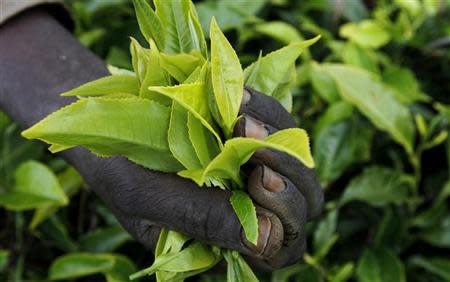Kenya's small-scale tea farmers see revenue increase, prices fall

NAIROBI (Reuters) - Revenue from tea produced by Kenya's small-scale farmers climbed 13 percent to 69 billion shillings in the year to June, the Kenya Tea Development Agency (KTDA) said on Monday, as it warned lower leaf prices could hurt tea earnings going forward. Tea is a leading foreign exchange earner in east Africa's largest economy and members of KTDA account for about 60 percent of tea output in Kenya, the world's top exporter of black tea. Small-scale farmers produced 1.1 billion kg of green leaf over the period compared to 970 million kg realised the previous year, KTDA said. "This has resulted in KTDA managed factories earning higher revenue of 69 billion shillings, up from 61 billion shillings earned in 2011/12 financial year," KTDA said in a statement. The rest of Kenya's tea is produced by large-scale farmers and corporations. Lerionka Tiampati, managing director of KTDA, said the amount payable to farmers per kg of tea made would drop by about 10 percent in the 2012/13 financial year due to the high cost of production and a stronger shilling. He said the average exchange rate in the past 12 months stood at 85 shillings to the dollar compared to the previous year's 89.16, negatively impacting total revenue. "The small scale tea sub-sector in Kenya has not been spared from the global market dynamics, but the high volumes delivered mean that farmers will even out," Tiampati said. Tiampati said the overall earnings for the Kenyan tea industry in 2013 could drop owing to depressed leaf prices since the start of the year. "The new 2013/2014 financial year has started on a low note, with the sub-sector witnessing depressed earnings at the Mombasa Tea Auction. This seems to continue for the better part of the year and is likely to impact on the next earnings if the situation does not change," Tiampati said. Tiampati added that the political crisis in Egypt, inefficiencies at the port of Mombasa, and uncertainty over Kenya's March 2013 general elections affected prices at the regional auction in Mombasa. The Tea Board of Kenya, the regulator, said in June the east African producer expects to produce 410-415 million kg of tea in 2013, up from 369 million kg last year, helped by good weather.

 Yahoo Finance
Yahoo Finance 